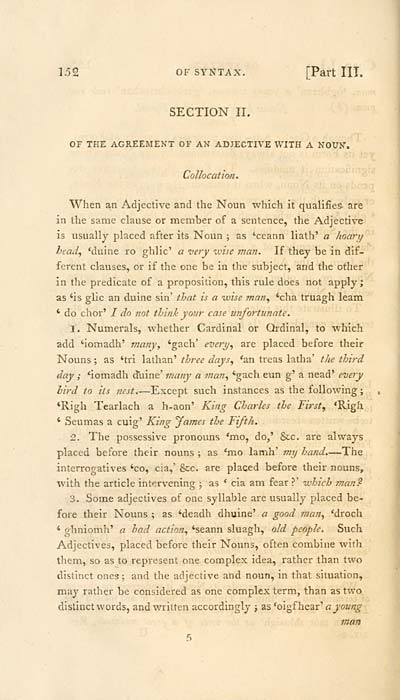Download files
Complete book:
Individual page:
Thumbnail gallery: Grid view | List view

152 OF SYNTAX. [Part III.
SECTION II.
OF THE AGREEMENT OF AN ADJECTIVE WITH A NOUN.
Collocation.
When an Adjective and the Noun which it qualifies are
in the same clause or member of a sentence, the Adjective
is usually placed after its Noun ; as 'ceann liath' a hoary
head^ 'duine ro ghlic' a very wise man. If they be in dif-
ferent clauses, or if the one be in the subject, and the other
in the predicate of a proposition, this rule does not apply ;
as 'is glic an duine sin' that is a ivise man., 'cha truagh learn.
' do chor' / do fiot think your case unfortunate.
1. Numerals, whether Cardinal or Ordinal, to which
add 'iomadh' many, 'gach' eiiery., are placed before their
Nouns ; as 'tri lathan' three days., 'an treas latha' the third
day ; 'iomadh duine' many a man, 'gach eun g' a nead' every
bird to its nest. — Except such instances as the following ;
'Righ Tcarlach a h-aon' King Charles the First, *Righ
' Seumas a cuig' King James the Fifth.
2. The possessive pronouns *mo, do,' &c. are always
placed before their nouns ; as *mo lamh' my hand. — The
interrogatives 'co, cia,' &c. are placed before their nouns,
with the article interv^ening ; as * cia am fear ?' which man?
3. Some adjectives of one syllable are usually placed be-
fore their Nouns ; as *deadh dhuine' a good man., 'droch
* ghniomh' a had action., 'seann sluagh, old people. Such
Adjectives, placed before their Nouns, often combine with
them, so as to represent one complex idea, rather than two
distinct ones; and the adjective and noun, in that situation,
may rather be considered as one complex term, than as two
distinct words, and written accordingly j as 'oigf hear' a young
man
5
SECTION II.
OF THE AGREEMENT OF AN ADJECTIVE WITH A NOUN.
Collocation.
When an Adjective and the Noun which it qualifies are
in the same clause or member of a sentence, the Adjective
is usually placed after its Noun ; as 'ceann liath' a hoary
head^ 'duine ro ghlic' a very wise man. If they be in dif-
ferent clauses, or if the one be in the subject, and the other
in the predicate of a proposition, this rule does not apply ;
as 'is glic an duine sin' that is a ivise man., 'cha truagh learn.
' do chor' / do fiot think your case unfortunate.
1. Numerals, whether Cardinal or Ordinal, to which
add 'iomadh' many, 'gach' eiiery., are placed before their
Nouns ; as 'tri lathan' three days., 'an treas latha' the third
day ; 'iomadh duine' many a man, 'gach eun g' a nead' every
bird to its nest. — Except such instances as the following ;
'Righ Tcarlach a h-aon' King Charles the First, *Righ
' Seumas a cuig' King James the Fifth.
2. The possessive pronouns *mo, do,' &c. are always
placed before their nouns ; as *mo lamh' my hand. — The
interrogatives 'co, cia,' &c. are placed before their nouns,
with the article interv^ening ; as * cia am fear ?' which man?
3. Some adjectives of one syllable are usually placed be-
fore their Nouns ; as *deadh dhuine' a good man., 'droch
* ghniomh' a had action., 'seann sluagh, old people. Such
Adjectives, placed before their Nouns, often combine with
them, so as to represent one complex idea, rather than two
distinct ones; and the adjective and noun, in that situation,
may rather be considered as one complex term, than as two
distinct words, and written accordingly j as 'oigf hear' a young
man
5
Set display mode to: Large image | Transcription
Images and transcriptions on this page, including medium image downloads, may be used under the Creative Commons Attribution 4.0 International Licence unless otherwise stated. ![]()
| Early Gaelic Book Collections > Blair Collection > Elements of Gaelic grammar > (184) |
|---|
| Permanent URL | https://digital.nls.uk/79042183 |
|---|
| Description | A selection of books from a collection of more than 500 titles, mostly on religious and literary topics. Also includes some material dealing with other Celtic languages and societies. Collection created towards the end of the 19th century by Lady Evelyn Stewart Murray. |
|---|
| Description | Selected items from five 'Special and Named Printed Collections'. Includes books in Gaelic and other Celtic languages, works about the Gaels, their languages, literature, culture and history. |
|---|

